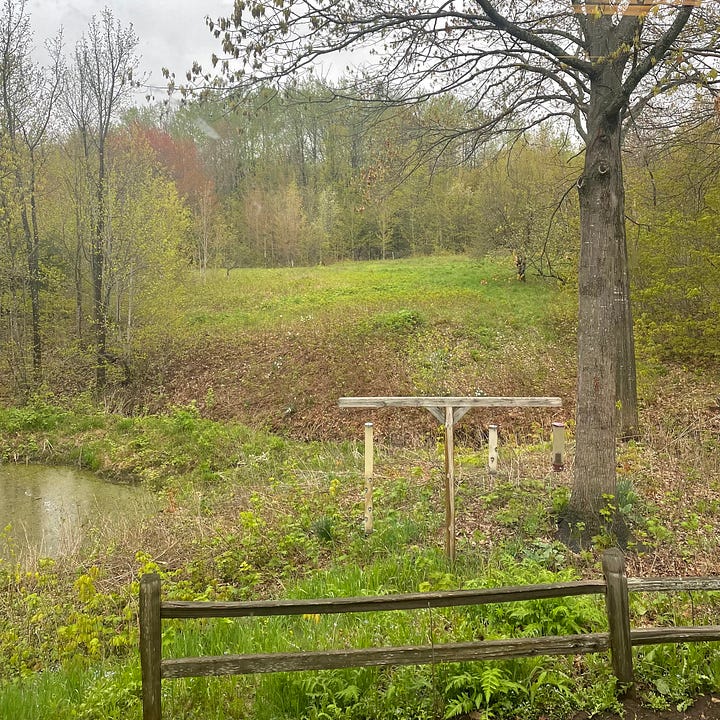Answering the Question
How honesty can actually be an exercise in faith
My grandpa retired the year I was born, an ending of sorts for him and a beginning for me. He was a high school biology teacher, which meant visits to my grandparents’ Upper Peninsula home usually included science lessons. We dissected cow hearts, held owl pellets, peered into microscopes, and poked pufferfish spines. One day, we traipsed through a bog to look for carnivorous plants. Does and fawns wandered in the field as we watched from the kitchen window, and once we thought we saw a wolf.
He has a library of stories about befriended animals, outdoor adventures, and classroom anecdotes. Sometimes he talks about how he prompted students to think for themselves by asking questions. If a student was dodging or stalling, my grandpa would simply say, “Answer the question.” Eventually that phrase became “ATQ.” Just answer the question.


Have you ever been asked a question that isn’t really a question, though? Maybe it’s the “But what about the homework?” right before the bell rings or an “Are you sure?” that squashes confidence. Some people are skilled at veiling criticism or opinions as innocent questions. Not all questions are created equal, and a lot can depend on the asker’s motivation. This may seem like a human-to-human issue, but I realized I often took a doubtful approach to questions in Scripture. Take Psalm 42 for example: “Why, my soul, are you so dejected? Why are you in such turmoil? Put your hope in God…” If I’m honest, there have been times I’ve interpreted that question almost as a taunt. “It’s not that bad, just be grateful. Just hope, don’t be sad.” From where I sat, those questions sounded like dismissals—get over it, move on. I felt like putting my hope in God, as the psalmist instructs, meant rushing through (or entirely ignoring) the “Why?” and my answers.
Then I got closer and discovered those questions are invitations. What if God actually cares about what we have to say? And since He, being God, already knows the answers, what if He asks questions because He truly cares about us? Yet here’s the thing: Being honest with God is incredibly hard to do when you’re not even honest with yourself.
I think of Jesus healing Bartimaeus.1 He stops in a busy city to ask a blind man a simple question. “What do you want me to do for you?”2 I imagine Bartimaeus pausing, a moment of silence. His answer: “I want to see.” Honesty is often a prologue that leads to healing. And that healing is itself a step on a journey with God.
Jesus, I like to think, might have been the first person Bartimaeus saw with new eyes. The One who waited long enough to hear his answer. Who moved through the crowd to come close, even as others passed by. I don’t think Jesus asks for our honesty so we can wallow in self-pity or elevate our truth. Believe me, I’ve been there—it’s nice until you realize you’re stuck. This story tells me He does it so we can move forward and follow Him.
Honesty isn’t a life hack to get what we want. Even if we don’t get what we ask for, our honesty is a place to meet with God, to know Him more deeply. Look your fears in the face, say your needs or problems out loud, acknowledge those disappointments and unfulfilled dreams, name what you feel and why. And then, even if your hands are shaking, place every last bit of your hope in the God who welcomes and wants your whole self. Have the courage to do it over and over again. You can answer the questions, friend. Your responses won’t push Him away. They’ll bring you closer.
“Is it possible that the reason I’m afraid to pray is because I’m afraid to be seen? That prayer not only reveals God, but myself, and that I’m not yet believing more in His love and compassion than my fear of rejection? That I don’t yet believe God desires me more than He criticises me? Honest prayer gives God the opportunity to be the loving, protecting, compassionate, and transforming presence He has told me He is. All I need to do is pray from who I truly am, not who I think God wants me to be, and allow Him to do the rest.”
— Commoners Communion
Mark 10:46-52
Jesus is question-asker extraordinaire. For example: Why did you doubt? (Matthew 14:31), What is it you want? (Matthew 20:21), What do you want me to do for you? (Matthew 20:32/Mark 10:51/John 1:38), Why are you so afraid? and Do you still have no faith? (Mark 4:40), Do you want to get well? (John 5:6), and Why are you crying? (John 20:15)



Thanks for writing and sharing these words!
"Honesty is often a prologue that leads to healing." SO good, my friend :)